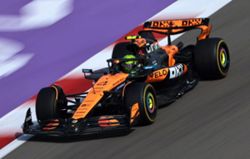
FILE PHOTO: A screen displays the logo for HP Inc. at the New York Stock Exchange (NYSE) in New York, U.S., November 18, 2019. REUTERS/Brendan McDermid/File Photo
(Reuters) -HP forecast its first-quarter profit below Wall Street expectations on Tuesday, signaling persistent choppy demand in the personal computers market and sending the company's shares down 8% in extended trading.
Traditional PC makers have been grappling with soft demand following a boom during the pandemic. AI-powered PCs are also yet to grab the attention of the mass market even as their demand increased in the corporate and educational sectors, thanks to businesses and institutions looking to upgrade their devices.
AI PCs have not boosted the overall PC demand as "buyers have yet to see their clear benefits", Gartner analyst Mikako Kitagawa said.
Global shipments of traditional PCs dipped 2.4% to 68.8 million in the third quarter, according to research firm IDC.
"You are going to see us expanding our AI portfolio in PCs. We are also going to introduce a new AI capability in Print (printing segment) ... we will be introducing a new family of video conferencing systems," HP CEO Enrique Lores told Reuters.
Traditional PC weakness and stiff competition also led to a third-quarter revenue miss for rival Dell.
HP expects its first-quarter adjusted profit per share to be between 70 cents and 76 cents, below analysts' estimate of 85 cents, data compiled by LSEG showed.
"We have stock-compensation expense that's higher in Q1 and it gets better in subsequent quarters," said Chief Financial Officer Karen Parkhill.
"We are taking pricing and cost actions to offset some of the margin headwinds in personal systems and that's going to have a more significant impact in the back half."
The company's revenue increased 1.7% to $14.1 billion for the fourth quarter, compared with the estimates of $13.99 billion.
Its adjusted profit of 93 cents per share met expectations.
For fiscal 2025, HP forecast its adjusted profit between $3.45 and $3.75 per share, with the midpoint in line with estimates.
(Reporting by Priyanka.G and Jaspreet Singh in Bengaluru; Editing by Shilpi Majumdar)










































